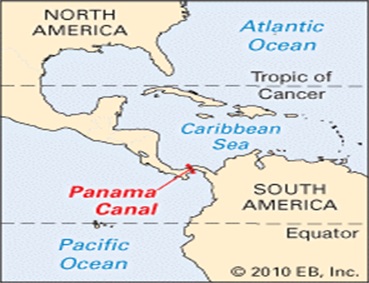| Mains Exam: General Studies Paper-2; Bilateral, regional and global groups and agreements related to India and/or affecting India's interests. |
Reference:
US President Donald Trump has criticized the transfer treaty signed earlier and reclaiming the Panama Canal.
US-Panama Treaty:
- The Panama Canal is an artificial 80 km long canal connecting the Atlantic and Pacific Oceans.
- It is an important traffic route for international shipping by reducing cost, time and distance.

- After its construction was completed by the US, it was opened in the year 1914 and the US remained in control of it till 31 December 1999.
- Under the first treaty related to the Panama Canal, the canal was handed over to the Panamanians on 31 December 1999.
- It is also called the Torrijos-Carter Treaty.
- The second treaty, called the Treaty of Permanent Neutrality, declared the canal to be neutral and kept it open to ships of all countries.
- Under this treaty, the US has the primary right to protect the neutrality of the canal and to use it in military emergencies.
Importance of Panama Canal:
- The Panama Canal is important for the global supply chain. 6% of the total global maritime trade passes through it. This canal is also a symbol of the technological and economic power of the US.
- It helps ships to eliminate the need to go through Cape Horn, the last tip of South America.
- Due to which ships have to travel 13,000 km less.
Reasons for opposition by the US:
- The main reason for its opposition by the US is the high transit fee imposed on American ships by the Panama Canal Authority.
- In 2023, there was a severe drought in the Gatun and Alhajuela lakes, which adversely affected shipping and navigation of the canal as the canal depends on these reservoirs for its operation.
- Therefore, the Panama Canal Authority reduced the number of slots for ships to pass by 36%. This led to an increase in transit fees.
- Another cause of concern is the increased presence of Chinese interference in the Panama Canal. In 2017, Panama became the first Latin American country to sign the Belt and Road Initiative (BRI) agreement and since then, Chinese investment has increased significantly.
- Hutchison Ports PPC, a subsidiary of a Hong Kong-based company, operates two ports near the entrance to the canal, raising concerns about Chinese influence on logistics operations and surveillance on the US Navy.
Panama's response
- According to Panama, transit rates are determined by a process in accordance with international standards.
- It has stressed the importance of sovereignty for Panamanians, denying the involvement of any external powers such as China or the European Community.
- According to Chinese Foreign Ministry spokesman Mao Ning, the Panama Canal is an important structure and a neutral route for the Panamanian people and China respects Panama's sovereignty.
Conclusion
While Panama's concerns over the increase in transit rates and operations are discussed diplomatically, both the US and Panama should seek international support to assert sovereignty.


